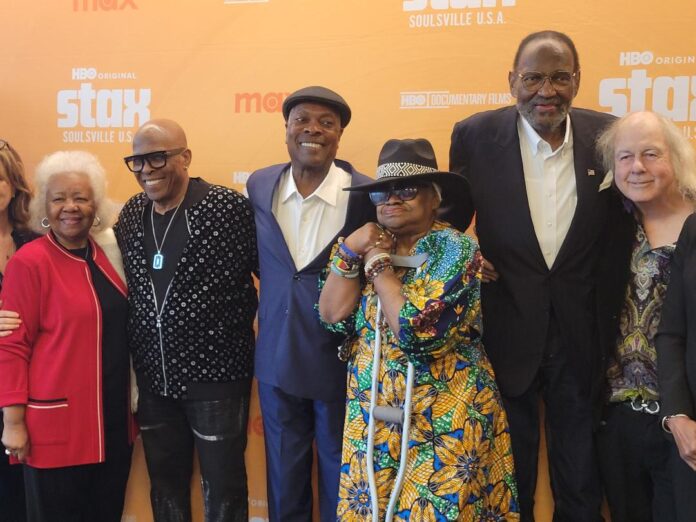It’s hard for me to be completely objective about Jamila Wignot’s two part documentary, “Stax: Soulsville, USA.” I made a film that included a lot about the fabled Stax Records (started in 1959 by Jim Stewart and his sister Estelle Axton) with Chris Hegedus and DA Pennebaker back in 2002. I know a lot about the subject and have a lot of opinions.
Two hours of the series air tonight on HBO, and two more on Tuesday this week. If you don’t know as much as I do, you should watch this film if only to see that Motown was not the only center of historic R&B greatness in the 1960s. They were the beacon of the south, even more than Sam Phillips’s Sun Records. Unlike Motown way up north in Detroit, Stax, however, faced financial problems from the beginning. They closed for good in 1975.
But look at this roster of artists: Sam & Dave, Rufus and Carla Thomas, Otis Redding, Isaac Hayes, Booker T and the MGs, Eddie Floyd and William Bell are just the tip of the iceberg from the 60s. When Atlantic Records’ legendary producer Jerry Wexler realized what was going on in Memphis, he went down there and made a deal. Suddenly the border between Stax and Atlantic was open, which was good and bad since Stax was had to fight to keep its identity. (After a time, Wexler moved to Muscle Shoals, Alabama, but that’s another story.)
In 1971, Stax started a new chapter apart from Atlantic. They had two or three years of huge hits with songs like The Staples Singer’s “I’ll Take You There,” the Dramatics’ “What You Is What You Get,” and Isaac Hayes’s “Shaft,” not to mention the still played “Mr. Big Stuff” by Jean Knight.
Columbia Records took them over after that, when Clive Davis wanted to add Black music to the label. (He already had Earth Wind & Fire, and Santana.) He gave them a fairly liberal contract, but when he was scapegoated and fired by management (a long story — we know the heights he went on to climb) the Columbia board ripped up the deal and Stax was over.
Episodes 1 and 2 tonight do offer comprehensive pieces on Redding, Sam Moore of Sam and Dave, Carla Thomas, and Booker T. Jones. Carla and Booker were at the premiere screening held in New York by HBO last week, and it’s clear that Wignot had a lot of affection for them in the making of her film. You can’t not love them. Plus their music has a lasting resonance in history, as much as Motown or Memphis’s Hi Records (also not in this conversation).
When we filmed at the old Stax studios in 1999, the original building had been leveled long ago and was just a lot of weeds. Well after that visit, many years later, the Stax Foundation and Academy were built on the site to resemble the old headquarters. You’d think that new edifice — which is brimming with recording and students — would have been the cherry on the top of this documentary. But it’s not. That’s a disappointment. The story would have had a happy ending.
That’s where frustrating omissions begin: missing from this series are a lot of artists important to Stax. William Bell, Eddie Floyd, Jean Knight, the Dramatics, and most importantly the Staples Singers are nowhere to be found. (There are plenty of others also lost including the Soul Children and the Mad Lads.)
Bell, in particular, still very much alive, had the first Stax hit with “You Don’t Miss Your Water.” Knight’s “Mr. Big Stuff” overnight revitalized the label. There’s also no mention of Wilson Pickett, who was cousined into Stax via Atlantic. There’s not a lot on Rufus Thomas, Carla’s dad, no “Walking the Dog” or any indication of his importance to the label as a performer or as a deejay on WDIA, where he played Elvis for the first time on Black radio.
A lot of “Stax: Soulsville USA” centers on race. Memphis, after all, was where Dr. Martin Luther King Jr. was assassinated. But as Carla Thomas remembers it to me, Stax Records was really about the music. It was about Black and white musicians working together in harmony. In the 60s, Stax remained mostly in a bubble. They didn’t have a political song until “I’ll Take You There,” which was written by the label’s famed PR man, Al Bell. (He’s in the film, but the connection to the song isn’t made.)
Wignot’s series is well worth watching. But then listen to Stax (there’s plenty of it on Spotify and on CD) music. There’s also a terrific book by Graham Betts. But kudos to Wignot and her company for even having the desire to showcase these wonderful musicians and their accomplishments.

